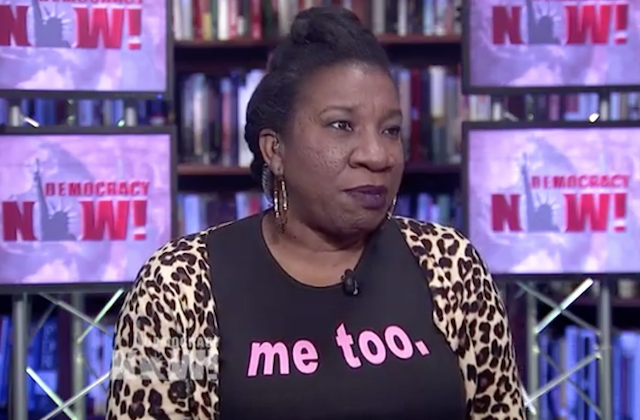On Sunday (October 15), actress Alyssa Milano responded to the growing sexual assault accusations against Hollywood mogul Harvey Weinstein by tweeting an invitation to post about experiences with sexual harassment and assault.
This call compelled women across the world to disclose by including "me too" or "#MeToo" in a tweet. It also prompted media coverage that overlooked a key part of the campaign that Milano didn’t acknowledge until later: a Black woman, organizer and writer Tarana Burke, launched the "Me Too" campaign a decade ago.
"That’s how media works," Burke said while addressing how media outlets erased her role during an appearance on Democracy Now! this morning (October 17).
Burke went on to discuss "Me Too," which she started as a specific call for solidarity and healing among sexual assault survivors. She developed the campaign in 2007 while working as a youth counselor in the South, intending to reach the survivors of color that the region’s rape crisis centers did not:
As a survivor of sexual violence myself, as a person who was struggling and trying to figure out what healing looked like for me, I also saw young people—particularly young women of color in the community I worked with—struggling with the same issues. [I was] trying to find a succinct way to show empathy. We use a term, "empowerment through empathy," and "me too" was so powerful because somebody had said it to me, and it changed the trajectory of my healing process once I heard that. Because the rape crisis centers in this community didn’t go to schools or do outreach—and I’m an organizer by training—it made sense to me that you have to bring it to people, people aren’t going to seek it out. "Me too" is about reaching the places that other people wouldn’t go, bringing messages, words and encouragement to the survivors of sexual violence where other people wouldn’t be talking about it.
Burke’s campaign specifically addressed the silence around Black women and girls who survive sexual violence. The increased popularity of the term after Milano’s tweet prompted accusations that White women were appropriating it without giving Burke due credit. While Burke tells Democracy Now! that she "appreciates the hashtag," she elaborates that the campaign has a longer-term focus that extends beyond one social media action:
The work that I’m doing, in this movement, is really about survivors talking to survivors. "Me too" is about using the power of empathy to stomp out shame. So we need to keep talking about it. I appreciate the hashtag elevating the conversation, but it’s not a hashtag, it’s not a moment. This is a movement. The reason people didn’t know my name is because people don’t think about this unless there is something big happening. So what needs to happen is that we need to stop just popping up when somebody famous does something, and we need to look at the numbers, people and survivors, and think strategically. I think like an organizer, and this is an epidemic.
Watch the full interview, including brief comments from journalist Soraya Chemaly and Black Lives Matter co-founder Alicia Garza, above.
